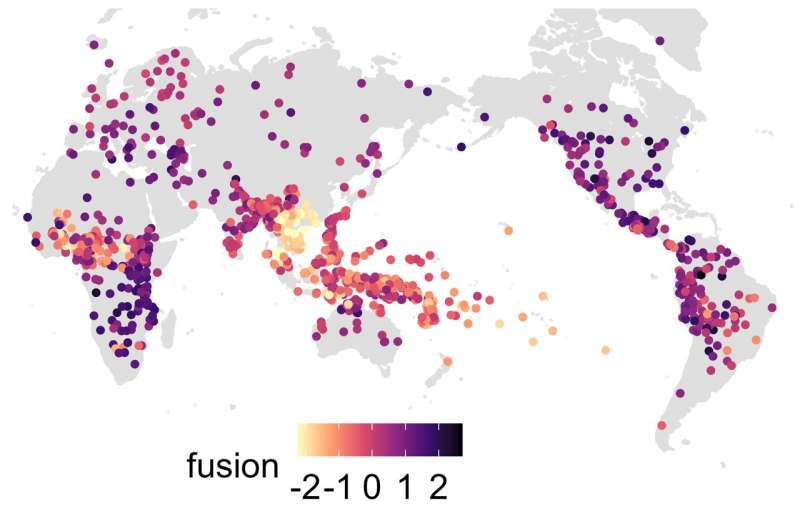This article has been reviewed according to Science X's editorial process and policies. Editors have highlighted the following attributes while ensuring the content's credibility:
fact-checked
peer-reviewed publication
trusted source
proofread
The evolution of complex grammars: New study measures grammatical complexity of 1,314 languages

Languages around the world differ greatly in how many grammatical distinctions they make. This variation is observable even between closely related languages. The speakers of Swedish, Danish, and Norwegian, for example, use the same word hunden, meaning "the dog," to communicate that the dog is in the house or that someone found the dog or gave food to the dog. In Icelandic, on the other hand, three different word forms would be used in these situations, corresponding to the nominative, accusative, and dative case respectively: hundurinn, hundinn, and hundinum.
This grammatical distinction in the case system, along with many others, sets Icelandic apart from its closely related sister languages. "One prominent hypothesis about why some languages show more complex grammar than others links grammatical complexity to the social environments in which these languages are used," says first author Olena Shcherbakova from the Max Planck Institute for Evolutionary Anthropology.
For example, Icelandic is primarily learned and used by the local population of over 350,000 people. Such relatively small isolated communities are also called "societies of intimates." In contrast, the other Scandinavian countries, located in close proximity to their neighbors, have larger populations with substantial proportions of non-native speakers.
Such communities are known as "societies of strangers." Many linguists have claimed that languages with more non-native speakers tend to simplify their grammars, as unlike children, adult learners struggle to acquire complex grammatical rules to master the intricacies of their new language.
But is this Icelandic example representative of the striking linguistic diversity worldwide? Researchers at the Max Planck Institute of Evolutionary Anthropology wanted to find out if the grammars of languages tend to evolve simpler when spoken by larger societies of strangers with many non-native speakers.
For their study published in Science Advances, they measured the grammatical complexity of 1,314 languages using data from Grambank—a newly released global database of grammatical features. These complexity scores were compared to variables detailing the number of non-native speakers in these languages.
Defining complexity
Language complexity is a hotly debated topic in linguistics, with many different opposing views. "Many of the disagreements are down to differences in how 'complexity' is defined," says Hedvig Skirgård from the Max Planck Institute of Evolutionary Anthropology.
"In this study, we improved the methodology by teasing out two distinct measures: fusion (how many affixes verbs and nouns have) and informativity (how many distinctions are made)."
The results show that societies of strangers do not speak less complex languages. "Instead, our study reveals that the variation in grammatical complexity generally accumulates too slowly to adapt to the immediate environment," states Shcherbakova.
The well-known counterexample to the claim about social environment shaping grammatical complexity is German. German is learned and spoken by a large number of non-native speakers, and yet, it has retained its case system and many other grammatical distinctions.
The study tests the influence of social environment on grammatical complexity, while accounting for the expected similarities arising from both genealogical inheritance and contact. "Our study highlights the significance of using large-scale data and accounting for the influence of inheritance and contact when addressing long-standing questions about the evolution of languages. It shows how received linguistic wisdom can be rigorously tested with the global datasets that are increasingly becoming available," concludes Simon Greenhill from the University of Auckland.
More information: Olena Shcherbakova, Societies of strangers do not speak grammatically simpler languages, Science Advances (2023). DOI: 10.1126/sciadv.adf7704. www.science.org/doi/10.1126/sciadv.adf7704
Hedvig Skirgård et al, Grambank v1.0, Zenodo (2023). DOI: 10.5281/zenodo.7740139
Journal information: Science Advances
Provided by Max Planck Society




















